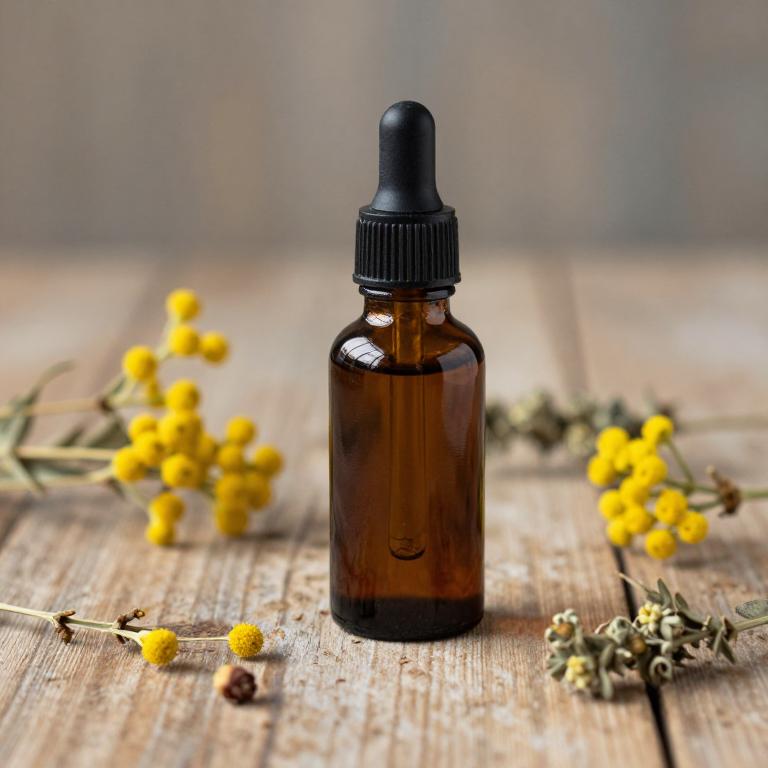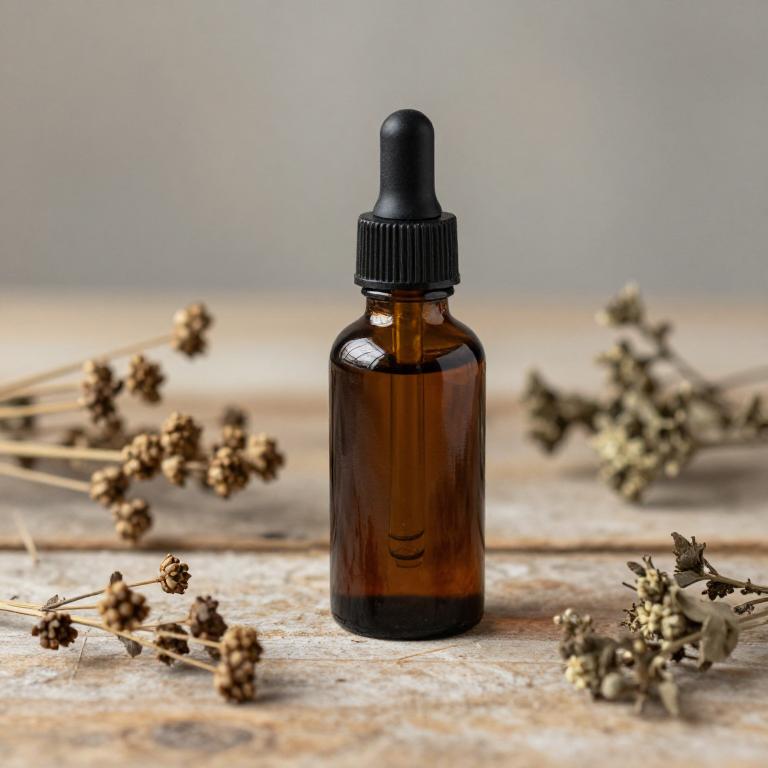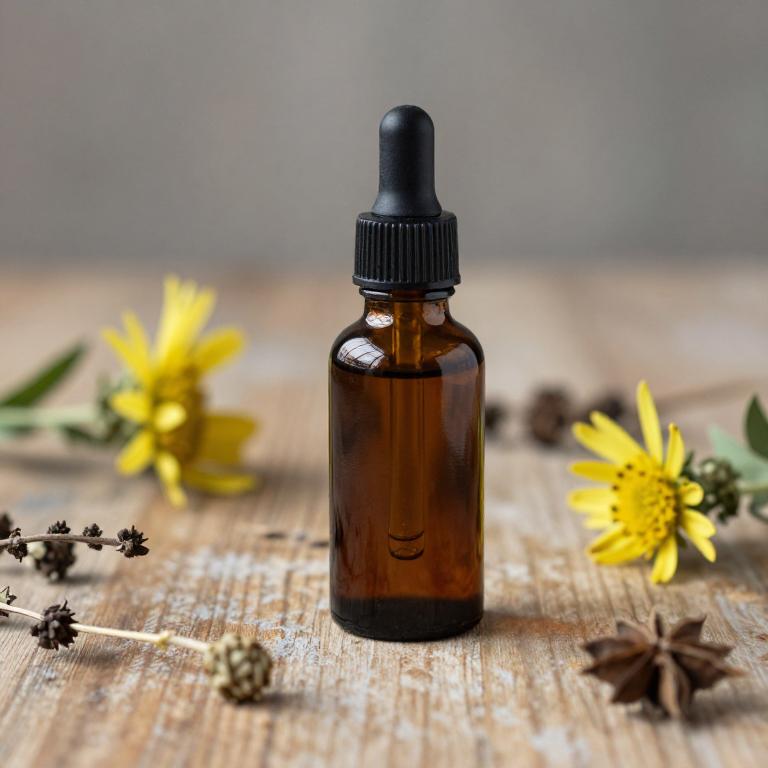10 Best Herbal Tinctures For Bladder Infection

Herbal tinctures have gained popularity as a natural alternative for managing symptoms of bladder infections, often containing ingredients like uva ursi, goldenseal, and cranberry.
These tinctures are believed to support urinary tract health by reducing inflammation and promoting the elimination of bacteria from the bladder. While they may provide relief for mild cases, they are not a substitute for medical treatment, especially in severe or recurrent infections. It is important to consult a healthcare provider before using herbal tinctures to ensure safety and effectiveness, particularly for individuals with existing health conditions or those taking other medications.
Overall, herbal tinctures can be a complementary approach when used under professional guidance.
Table of Contents
- 1. St. john's wort (Hypericum perforatum)
- 2. Stinging nettle (Urtica dioica)
- 3. Barberry (Berberis vulgaris)
- 4. Thyme (Thymus vulgaris)
- 5. Yarrow (Achillea millefolium)
- 6. Blessed thistle (Cnicus benedictus)
- 7. Field horsetail (Equisetum arvense)
- 8. Rosemary (Rosmarinus officinalis)
- 9. Purple coneflower (Echinacea angustifolia)
- 10. Echinacea (Echinacea purpurea)
1. St. john's wort (Hypericum perforatum)

Hypericum perforatum, commonly known as St. John's wort, is traditionally used in herbal medicine for its potential anti-inflammatory and antimicrobial properties.
While it is well-known for its use in treating mild depression, some studies suggest it may also have benefits for urinary tract health. Herbal tinctures made from Hypericum perforatum can be used as a complementary therapy for bladder infections due to their ability to reduce inflammation and support the healing process. However, it is important to note that St. John's wort may interact with certain medications and should not replace prescribed treatments for infections.
Always consult with a healthcare professional before using any herbal remedy, especially for conditions like bladder infections.
2. Stinging nettle (Urtica dioica)

Urtica dioica, commonly known as stinging nettle, is a traditional herbal remedy that has been used for various health conditions, including bladder infections.
When prepared as a tincture, Urtica dioica is believed to possess anti-inflammatory and antimicrobial properties that may help alleviate symptoms associated with urinary tract infections. The tincture is typically made by soaking the dried leaves and roots in alcohol, allowing the active compounds to be extracted over time. Some studies suggest that compounds in stinging nettle, such as flavonoids and polysaccharides, may support urinary health by reducing irritation and promoting healing.
While it is often used as a complementary therapy, it is important to consult a healthcare professional before using Urtica dioica tinctures, especially for individuals with existing medical conditions or those taking other medications.
3. Barberry (Berberis vulgaris)

Berberis vulgaris, commonly known as barberry, contains an active compound called berberine, which has been traditionally used for its antimicrobial and anti-inflammatory properties.
Herbal tinctures made from Berberis vulgaris are often used as a natural remedy to support urinary tract health, particularly in the management of bladder infections. Studies suggest that berberine may help reduce bacterial adhesion to the urinary tract lining, thereby preventing infection progression. These tinctures are typically taken orally in diluted form, and they are generally considered safe for most adults when used as directed.
However, it is important to consult with a healthcare provider before using Berberis vulgaris tinctures, especially for individuals with pre-existing medical conditions or those taking other medications.
4. Thyme (Thymus vulgaris)

Thymus vulgaris, commonly known as thyme, is a herb that has been traditionally used for its antimicrobial and anti-inflammatory properties, making it a potential natural remedy for bladder infections.
Thymus vulgaris herbal tinctures are concentrated liquid extracts prepared by soaking the dried herb in alcohol, which helps preserve its active compounds such as thymol and carvacrol. These compounds are known to inhibit the growth of bacteria, including those commonly responsible for urinary tract infections, such as Escherichia coli. While thyme tinctures may offer supportive relief, they should not replace prescribed antibiotics for severe or persistent bladder infections.
It is important to consult a healthcare professional before using thyme tinctures, especially for individuals with allergies or those taking other medications.
5. Yarrow (Achillea millefolium)

Achillea millefolium, commonly known as yarrow, has been traditionally used in herbal medicine for its anti-inflammatory and antimicrobial properties.
When prepared as a tincture, it may support the urinary tract by reducing inflammation and promoting healing in the bladder lining. While not a substitute for medical treatment, some studies suggest that yarrow tinctures may help alleviate symptoms associated with bladder infections due to their diuretic and antiseptic effects. It is often recommended to use yarrow tinctures under the guidance of a qualified herbalist or healthcare provider, especially for individuals with pre-existing health conditions.
As with any herbal remedy, it is important to consult a healthcare professional before use, particularly if you are taking other medications or have a history of kidney issues.
6. Blessed thistle (Cnicus benedictus)

Cnicus benedictus, also known as St. Benedict's thistle, is a traditional herbal remedy that has been used for its potential antimicrobial and anti-inflammatory properties.
Herbal tinctures made from Cnicus benedictus are sometimes used to support urinary tract health, including the treatment of bladder infections due to their ability to reduce inflammation and combat bacterial growth. The active compounds in the plant, such as sesquiterpene lactones, may contribute to its efficacy in addressing urinary tract infections. While some preliminary studies suggest its potential benefits, it is important to consult a healthcare professional before using Cnicus benedictus tinctures, as they may interact with other medications or have side effects.
As with any herbal treatment, individual responses can vary, and it should not replace conventional medical care for bladder infections.
7. Field horsetail (Equisetum arvense)

Equisetum arvense, commonly known as field horsetail, has been traditionally used in herbal medicine for its potential benefits in treating urinary tract infections, including bladder infections.
The plant is rich in silica and other bioactive compounds that may support urinary health and reduce inflammation. Herbal tinctures made from Equisetum arvense are often prepared by soaking the dried plant material in alcohol to extract its medicinal properties. These tinctures are typically taken in small doses, either directly or diluted in water, to help alleviate symptoms of bladder infections.
While some studies suggest that Equisetum arvense may have antimicrobial and diuretic effects, it is important to consult a healthcare professional before using it, as it may interact with certain medications or have side effects.
8. Rosemary (Rosmarinus officinalis)

Rosmarinus officinalis, commonly known as rosemary, is often used in herbal tinctures for its antimicrobial and anti-inflammatory properties.
These tinctures may help support urinary tract health by reducing bacterial growth and soothing bladder irritation. While rosemary is not a substitute for medical treatment, it can be used as a complementary therapy under the guidance of a healthcare professional. The essential oils in rosemary, such as cineole, are believed to have a positive effect on urinary tract infections when properly diluted.
However, it is important to consult a physician before using rosemary tinctures, especially for individuals with existing health conditions or those taking other medications.
9. Purple coneflower (Echinacea angustifolia)

Echinacea angustifolia herbal tinctures are traditionally used to support the immune system and may offer potential benefits for individuals suffering from bladder infections due to their antimicrobial and anti-inflammatory properties.
This specific species of echinacea is known for its high concentration of active compounds such as alkamides, caffeic acid derivatives, and polysaccharides, which contribute to its immune-modulating effects. While there is limited clinical evidence specifically linking echinacea angustifolia tinctures to the treatment of bladder infections, some studies suggest that echinacea may help reduce the duration and severity of urinary tract infections. It is important to note that echinacea should not replace conventional medical treatments for bladder infections and should be used as a complementary therapy under the guidance of a healthcare professional.
As with any herbal supplement, individual responses may vary, and potential interactions with other medications should be considered.
10. Echinacea (Echinacea purpurea)

Echinacea purpurea herbal tinctures are commonly used for their immune-boosting properties, but their role in treating bladder infections is less well-established.
While some studies suggest that echinacea may help reduce the severity and duration of urinary tract infections (UTIs) by enhancing immune response, more research is needed to confirm its efficacy specifically for bladder infections. The tincture is typically made by soaking the dried roots or flowers of the echinacea plant in alcohol, creating a concentrated form of the herb. It is often used as a complementary therapy alongside conventional treatments like antibiotics, though it should not replace medical advice or prescribed medication.
Due to its potential interactions with other medications and the risk of allergic reactions, it is important to consult a healthcare professional before using echinacea tinctures for bladder infections.